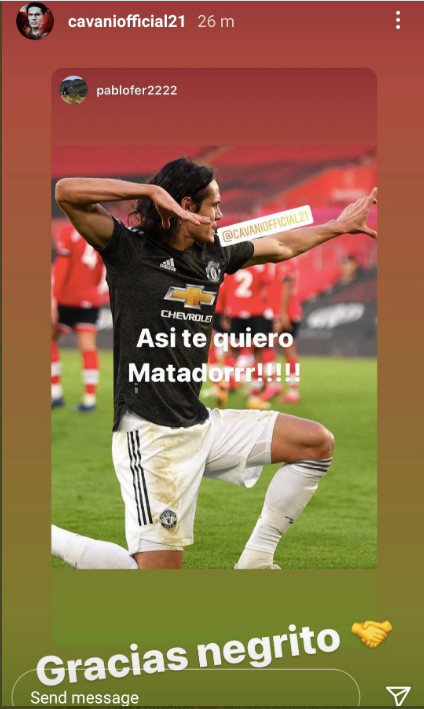Edinson Cavani and the question of cultural racism
- benpawlowski
- Dec 27, 2020
- 4 min read
Updated: Dec 28, 2020
Racism is part of our society. Lamentably, this is a fact; a fact that the events of 2020 have served to further perpetuate. George Floyd's tragic death reignited a discussion around police brutality, vividly demonstrating the asymmetry between the treatment of white and black people within America. These initial discussions were subsequently followed by nationwide protests, united under the umbrella of Black Lives Matter, which voiced grassroot disgust at centuries of incessant racial inequality. These protests spread eastwards across the Atlantic. Whether confined to social media due to the Covid-19 pandemic, or masked-up on the streets, many Brits, above all young people, expressed their frustration at an issue which has been continually neglected.
Racism is also, sadly, a part of football. Recent years have seen a number of individual cases highlighted - Raheem Sterling, Callum Hudson-Odoi, Antonio Rudiger, Cyrus Christie and Mario Balotelli were all targeted in stadiums in 2019; countless others have suffered online. Recently, the return of fans to stadia in England was marred by fans at both Millwall and Colchester booing their players taking the knee in support of racial equality.
One somewhat pleasing aspect of the nightmarish episode of 2020 is that, via the widescale protests that followed Floyd's death, racism has started to consolidate itself as a key issue. In previous years, politicians and decisionmakers were all too content to shun the problem into the shadows - now, it is front and centre and must be addressed. Politically, BLM protests and the overall topic of racial inequality formed a sizeable chunk of discussion within the 2020 Presidential Election. Donald Trump's reaction to the protests may have been the dagger blow to his chances of re-election.
In terms of football, the FA and other footballing bodies have united to combat the evil of racism. Some argue that football and politics should never mix, but racism is an issue far greater than politics. During Project Restart, players' shirts were adorned with the line 'Black Lives Matter' rather than their names. Anti-racism campaigns such as No Room For Racism and Kick It Out were backed. Players took the knee and media outlets stressed their support for the movement. FA Chairman Greg Clarke was forced to resign in November for racially insensitive comments to MPs. All in all, it represented a pleasing break from years of inertia.

Thus, the FA should be praised for recent action. However, with a topic as sensitive as racism, each case should be approached independently, and within its context. The ongoing case of Edinson Cavani is an example where the FA have crossed that barrier, and through that very action have unearthed an inherent cultural ignorance and a wealth of Anglocentric tendencies which themselves are attitudes that can be characterised as racist.
Cavani was charged by the FA after a social media post following his brace in Manchester United's 3-2 comeback victory away at Southampton. The charge read as follows: "Edinson Cavani has been charged with misconduct for a breach of FA Rule E3, in relation to a social media post on Thursday 29 November 2020. It is alleged that, contrary to FA Rule E3.1, a comment posted on the Manchester United FC player's Instagram page was insulting and/or abusive and/or improper and/or brought the game into disrepute. It is further alleged that the comment constitutes an 'Aggravated Breach', which is defined in FA Rule E3.2, as it included a reference, whether express or implied, to colour and/or race and/or ethnic origin. The striker has until Monday 4 January 2021 to provide a response to the charge.”

So, what did Cavani do? He posted a comment on his Instagram, thanking a friend for his support after his goalscoring antics on the south coast. 'Gracias negrito' he wrote. 'Negrito', when directly translated into English, means 'little black man'. In this context, then of course Cavani's comment is racist. However, the context is different. Languages are different semantically, and therefore translations should never be literal. English itself has a vast repertoire of idiomatic phrases which would have different meanings when translated literally. Translations should take into account cultural norms, and in this context a better translation of 'negrito' would be 'mate' or 'pal'. The term, within South America (Cavani's homeland), is affectionate. It is not malicious and nor it is racist.
A lack of appreciation for cultural and linguistic differences is quasi-xenophobic, and the idea that everything, even in foreign languages and cultures, should be judged by Western norms of thought suggests that Western morals and cultural standards are superior. In this case, the FA are the perpetrators of a form of cultural racism. This is an indictment exacerbated by the fact that Cavani is a foreign worker being punished for an inadequate understanding of the English language and British cultural standards - anyway, why should British cultural standards be applied when speaking in a foreign language with a foreign friend?
In my opinion, Cavani has done nothing wrong. When speaking in Spanish to a fellow Uruguayan, he applied South American cultural norms when affectionately calling a friend 'negrito'. When made aware that, within a Western context, his comments could be offensive, he immediately deleted his post, and offered a sincere and proper apology explaining the misunderstanding. Yet the FA have pressed on with the charge.
It is understandable why the FA have failed to relent. For an organisation clouded in accusations of institutional racism, a no-tolerance approach is expected, especially considering recent social upheaval. However, understanding why something is done does not make it right. A no-tolerance approach on racism is not an excuse for a lack of common sense, nor for espousing a stance that is culturally racist. The fact that Cavani is facing a three-match ban for a cultural misunderstanding that, in the grand scheme of things, is wildly insignificant, is saddening. Nor does it do much to endear the FA to the footballing public, a relationship which recently, through an amalgam of different fiascos, has been bereft of any trust or support whatsoever.







Comments